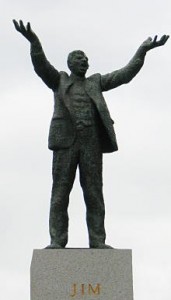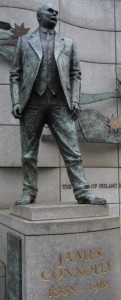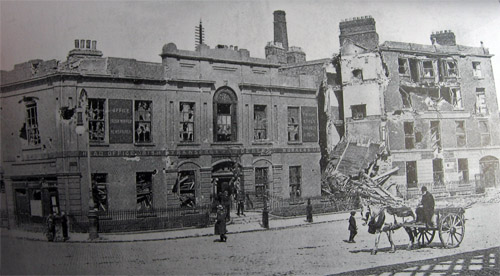Today marks 100 years since the organisation of a labour union that played a crucial role in Irish independence. On 20 January 1909, union cards were issued to the first members of the Irish Transport Worker’s Union. Those members’ commitment would help bring Ireland to the Easter Rising of 1916. In a real way, they made possible tomorrow’s celebrations of the 90th anniversary of the First Dáil Éireann.
 The Irish Transport and General Workers’ Union (as it was called a few years later) held the strike that led to the Great Lockout of 1913. During the strike, the leader of the ITGWU, James Larkin, gave speeches all over Dublin despite being arrested for seditious libel and released on bail. The reason for his arrest? In a speech on 28 August 1913 he said: “Before I go any further, with your permission I am going to burn the Proclamation of the King. People make Kings and people can unmake them.”
The Irish Transport and General Workers’ Union (as it was called a few years later) held the strike that led to the Great Lockout of 1913. During the strike, the leader of the ITGWU, James Larkin, gave speeches all over Dublin despite being arrested for seditious libel and released on bail. The reason for his arrest? In a speech on 28 August 1913 he said: “Before I go any further, with your permission I am going to burn the Proclamation of the King. People make Kings and people can unmake them.”
During the Great Lockout, Larkin and James Connolly helped establish an Irish Citizen Army to counter the thugs hired by employers and to protect workers’ meetings. The Irish Citizen Army was also, by its constitution, to pursue nationalist aims for Ireland. James Connolly said, in commemoration of the workers killed in the Lockout one year before:

Our fight of last year was not for added wages and reduction of hours; it was for an opportunity of building up in our midst men and women, a chance to develop nobility and grandeur of character for men and women, a time to realise the nobility of life, to study the history of Ireland, to study our rights as well as our duties; time to develop men and women for the coming crisis, so that they might take advantage of it when it came. … If you are itching for a rifle, itching to fight, have a country of your own; better to fight for our own country than for the robber empire. If ever you shoulder a rifle, let it be for Ireland. … You have been told you are not strong, that you have no rifles. Revolutions do not start with rifles; start first and get your rifles after. Our curse is our belief in our weakness. We are not weak, we are strong. Make up your mind to strike before your opportunity goes.
Less than two years later, on Easter Monday, 1916, the Irish Citizen Army fought alongside the Irish Volunteers in St Stephen’s Green and the GPO. The British gunboat that shelled Dublin singled out the headquarters of the ITGWU on Beresford Place, Liberty Hall, for special attention.

Several months passed before Irish nationalism recovered from the military defeat of the Easter Rising. James Connolly’s execution by firing squad at Kilmainham Jail for his role in the Rising inspired tens of thousands to join the ITGWU. The union led a general strike against conscription in 1918 that was one of the mainsprings for the First Dáil Éireann, which this blog will commemorate tomorrow.
Sources:
- Thanks to Tolka Rover of flickr for releasing the Big Jim Larkin photo under Creative Commons.
- Mick O’Farrell, A Walk Through Rebel Dublin 1916 (Mercier Press, 1999)
- Joseph E.A. Connell Jnr, Where’s Where in Dublin (Dublin City Council, 2006)